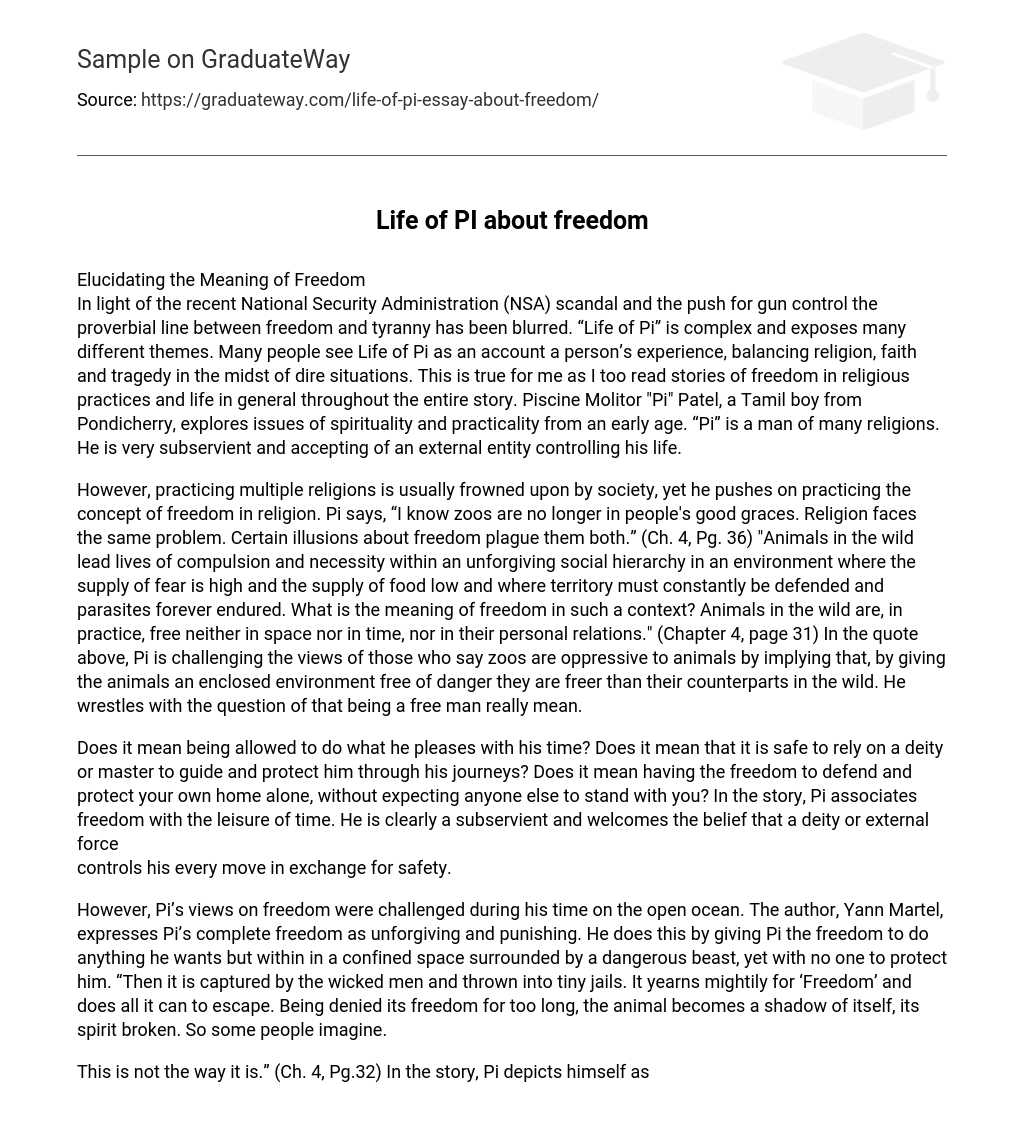Elucidating the Meaning of Freedom
In the midst of the recent National Security Administration (NSA) scandal and the push for gun control, the concept of freedom and tyranny has become blurred. The book “Life of Pi” is a complex story that explores various themes. Some view it as a personal account, where religion, faith, and tragedy are balanced amidst dire circumstances. I personally find stories of freedom within religious practices and everyday life throughout the entire narrative. Piscine Molitor “Pi” Patel, a Tamil boy from Pondicherry, delves into matters of spirituality and practicality from a young age. “Pi” is a follower of multiple religions and is submissive and accepting of an external force controlling his life.
Despite society’s disapproval of practicing multiple religions, he continues to embrace the idea of religious freedom. Pi acknowledges that both zoos and religion are no longer esteemed by society, stating “I know zoos are no longer in people’s good graces. Religion faces the same problem. Certain illusions about freedom plague them both” (Ch. 4, Pg. 36). Additionally, he reflects on the concept of freedom in relation to wild animals, questioning its meaning within their constrained lives: “Animals in the wild lead lives of compulsion and necessity within an unforgiving social hierarchy in an environment where the supply of fear is high and the supply of food low and where territory must constantly be defended and parasites forever endured. What is the meaning of freedom in such a context? Animals in the wild are, in practice, free neither in space nor in time, nor in their personal relations” (Chapter 4, page 31). By presenting this quote, Pi challenges prevailing beliefs that zoos oppress animals by suggesting that providing them with a protected environment actually grants them greater freedom compared to their counterparts in nature. He grapples with understanding what it truly means to be a free individual.
Is freedom defined as having the autonomy to make choices with one’s time? Can it also imply placing trust in a higher power or authority figure to navigate and safeguard oneself during life’s challenges? Additionally, could it encompass the ability to independently protect and defend one’s own home without relying on others for support? Within the narrative, Pi connects freedom with the luxury of leisure time. It is evident that he willingly embraces a submissive role, finding solace in the notion that a deity or external force controls his every action in exchange for protection.
Pi’s perspective on freedom is tested when he finds himself stranded at sea. Yann Martel, the author, portrays Pi’s version of freedom as harsh and punishing. The author accomplishes this by granting Pi the ability to do as he pleases but within the confines of a dangerous space, all while lacking protection. “Then it is captured by the wicked men and thrown into tiny jails. It yearns mightily for ‘Freedom’ and does all it can to escape. Being denied its freedom for too long, the animal becomes a shadow of itself, its spirit broken. So some people imagine.”
In Chapter 4, page 32, Pi expresses the belief that the current situation is not how things should be. In the story, Pi compares himself to a zoo animal. Some argue that because Pi is not receiving proper care, he cannot truly be a zoo animal. However, due to Pi’s faith in multiple gods, he believes that these gods will provide him with food and a safe resting place, protecting him from the sharks that act as parasites for animals. Despite desperately wanting to escape his confinement and have the freedom to walk and eat as he pleases, Pi considers himself to be free according to his own definition of freedom.
The protagonist in the tale enjoys leisure, is provided for, and protected from everything except Richard Parker, a Bengal tiger. Eventually, Richard Parker is tamed, but remains subdued and a mere shadow of himself. From this, I conclude that the human spirit cannot be genuinely liberated when restricted or controlled. This represents the type of freedom prisoners are afforded due to their circumstances. Regardless of the severity of confinement, both humans and animals yearn for complete freedom, even if it entails danger and necessitates a solitary existence. Only by undergoing the same confinement as Pi did, can humans truly comprehend the true nature of freedom’s absence.





